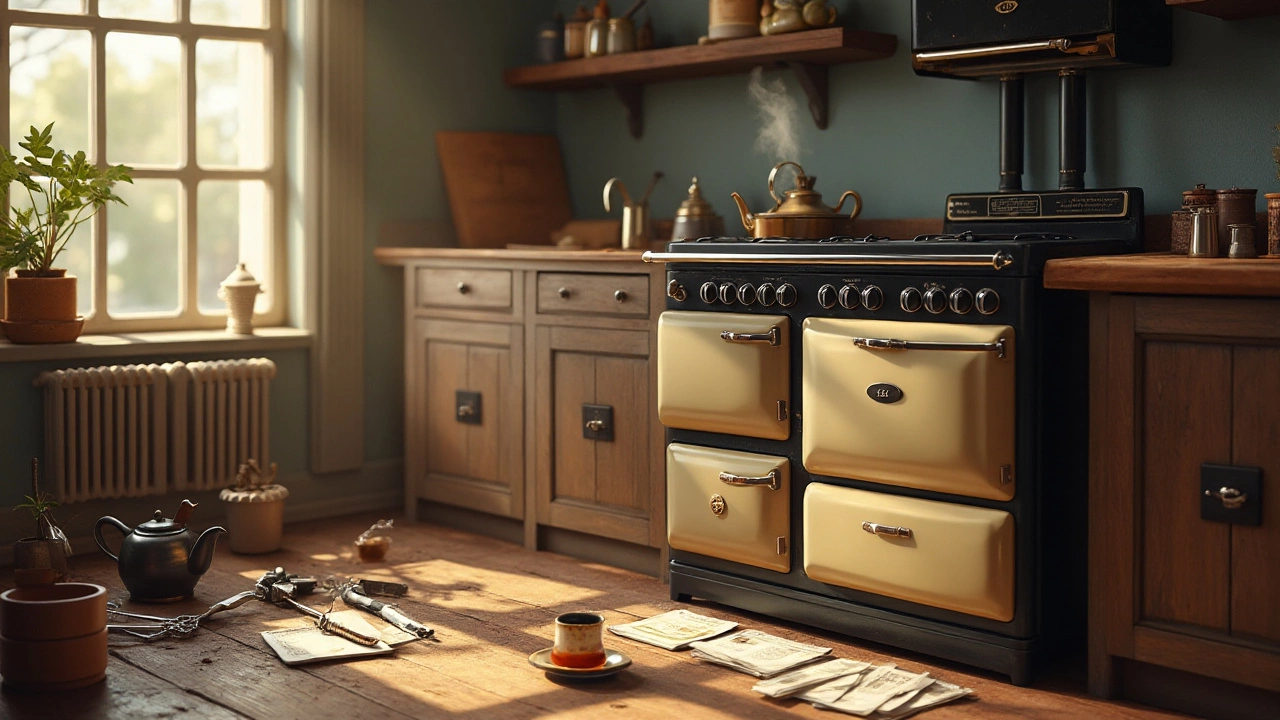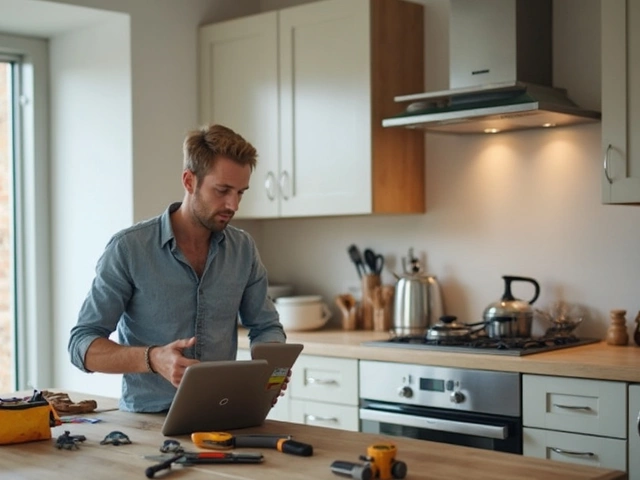If your cooker has stopped heating, making weird noises, or just won’t turn on, you’re probably wondering whether to call a tech or roll up your sleeves. The good news? Most cooker glitches are easy to spot and often cheap to fix. Below we break down the typical faults, what they cost, and when a professional is worth the call.
First up, know the tell‑tale signs. A burner that flickers or never ignites usually means a clogged pilot, a faulty ignition switch, or a worn‑out heating element. If the oven takes forever to warm up, the thermostat may be mis‑reading temperature or the heating coil could be cracked. Strange smells often point to a build‑up of food debris or a gas leak – the latter needs immediate professional attention.
Another frequent issue is uneven heating. This is common with electric hobs where one side works fine and the other stays cold. In most cases, the element has burned out or the connection is loose. Flip the breaker first; a tripped fuse can masquerade as a dead burner.
Simple things you can do yourself include cleaning the burner ports with a pin, checking the gas supply knob, and resetting the oven’s thermal fuse (usually a small, square piece near the back panel). You’ll need a screwdriver, a multimeter for continuity tests, and a safety glove. If the oven still won’t heat after resetting the fuse, it’s time to test the heating element with your multimeter. No continuity? Replace the element – it’s a cheap part, often under £30.
When the problem involves gas, wiring, or any component that’s sealed inside the cooker’s metal housing, call a qualified engineer. Bognor Regis Appliance Repair Experts have Gas Safe certification, so you won’t risk voiding warranties or breaching safety regulations.
Cost‑wise, a basic element swap runs between £70‑£120 including labour, while a full cooker overhaul can climb to £350‑£500 depending on age and model. If your cooker is older than 10‑12 years, compare the repair quote against a new unit’s price. Often a modern, energy‑efficient cooker will save you money on electricity or gas bills in the long run.
Before you decide, ask yourself three quick questions: Is the fault isolated to one part or the whole unit? How old is the appliance? And can you afford the repair versus a replacement? Answering these helps you avoid spending on a fix that won’t extend the cooker’s life much.
Finally, regular maintenance can stop many breakdowns. Wipe down burners after each use, descale the oven’s interior every few months, and run a quick self‑diagnostic (many modern cookers have a ‘test’ button) yearly. A little upkeep saves you from costly call‑outs later.
Whether you choose a DIY route or rely on Bognor Regis’ trusted technicians, knowing the basics of cooker repair empowers you to make smarter decisions and keep your kitchen humming. Got a specific issue? Jot it down, check the basic steps above, and if it still won’t cooperate, give the experts a call.

Curious how to fix a broken cooker? Explore hands-on steps, common faults, safety tips, and tricks to get your appliance working again—no jargon, just practical advice.

Wondering if you should throw out your seven-year-old oven or give it a second chance? This article breaks down when it makes sense to fix an older oven, what problems are easy or tough to repair, and how much money you might actually save. Get straight answers on costs, lifespan, and smart ways to keep your oven running. No fluff—just helpful facts and real advice you can use.

Wondering when to replace your cooker? This article breaks down the real signs that your cooker is on its last legs, what affects its lifespan, and how to keep it running safely for longer. Get practical tips straight from real-life experience and find out how to spot issues before they turn expensive. Whether you use gas or electric, knowing when to repair or replace makes all the difference in your kitchen.

If your cooker suddenly stopped working, it might be due to a range of reasons from electrical issues to simple user errors. Understanding the root cause is key to fixing the problem efficiently. In this article, we explore common reasons why cookers fail and offer practical troubleshooting tips to get your appliance working again. From checking the power supply to examining electrical components, we cover it all. Get your cooker back up and running with our straightforward guide.

Cookers are an essential part of any kitchen, and knowing their average lifespan can help in planning for replacements and repairs. On average, cookers last between 10 to 15 years depending on several factors like usage, maintenance, and brand quality. Regular maintenance and timely repairs can extend the life of your cooker significantly. Understanding the warning signs of wear and tear and knowing when to repair or replace can save both time and money. This article will dive into expert tips to maximize the life of your cooker.

Navigating the world of cooker repair can seem daunting, but armed with the right knowledge, it becomes manageable. This article explores common issues faced by cookers, signs that suggest whether repair is possible, and steps on how to approach fixing these vital kitchen appliances. By identifying whether a do-it-yourself fix is feasible or when to call in a professional, you can make informed decisions about your cooker. Learn about maintenance tips to prolong the life of your cooker and keep it working efficiently.

Choosing a cooker that stands the test of time can be daunting amid a sea of brands promising longevity. This article delves into which brands have stood out for their durability and reliability. By exploring user experiences and industry insights, it aims to guide you in the right direction. Discover how some brands maintain their reputation for endurance and what to consider when selecting your next appliance.

This article breaks down what 'appliance for a job' really means in the appliance service world. It explains common misunderstandings and clarifies whether it refers to equipment or applying for work. The piece gives real-world examples, explores the hiring process for technicians, and shares tips for both customers and job seekers. Straightforward info keeps things practical and easy to follow. If you've ever scratched your head at this phrase, you'll finally get the answer here.

Thinking about swapping out your extractor fan? This article breaks down when you really need a licensed electrician and when you might handle it yourself. Learn what risks and rules are involved, plus some practical tips for a painless install. Get clear answers on costs, permits, and what can go wrong if you take shortcuts. If you want fast, safe, and lasting results, this guide walks you through everything step-by-step.

In the business world, appliances aren't just about the gadgets in your kitchen; they're tools and strategies central to operations. From simplifying daily tasks to enhancing efficiency, appliances play pivotal roles in various business aspects. Understanding their function means knowing how technology, devices, and smart systems integrate into business to drive productivity. Delving into real-life examples, this article provides insights and tips on leveraging appliances effectively.

Experiencing no hot water in the shower can be frustrating, especially on cold mornings. This article provides practical solutions to diagnose and resolve common issues with your water heating system. From checking simple things like the thermostat to identifying more complex issues like a faulty heating element, you'll learn how to get back to enjoying a warm shower.

An electric hob on the fritz can leave you in a lurch, but knowing how much it costs to fix can help you prepare. We'll break down the average repair costs, consider factors like brand, parts, and labor, and help you decide if a repair or replacement makes more sense. Get the inside scoop on typical issues that might arise and how to avoid them in the future. With this guide, you'll feel more confident when talking to repair technicians and won't be caught off guard by unexpected expenses.